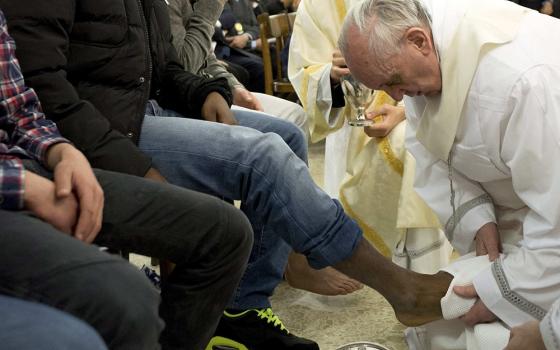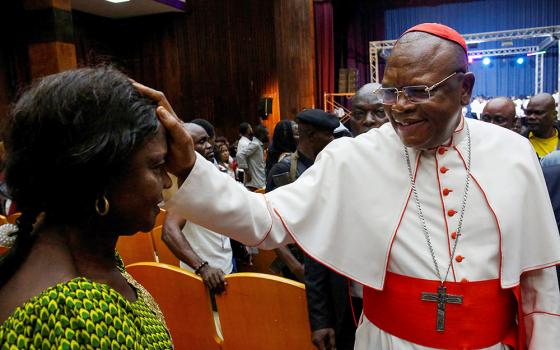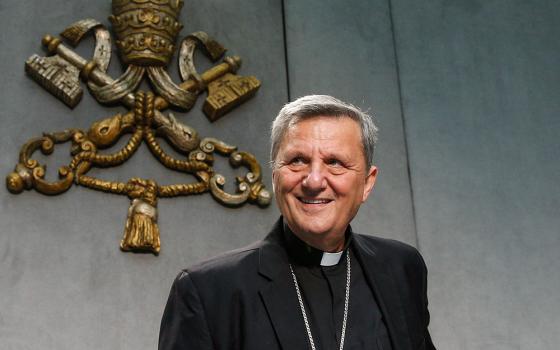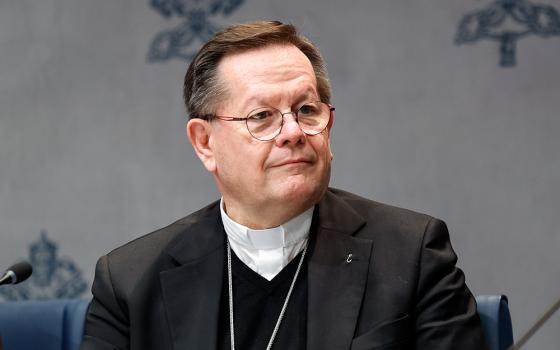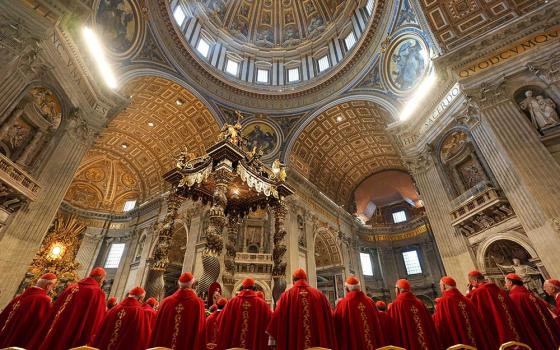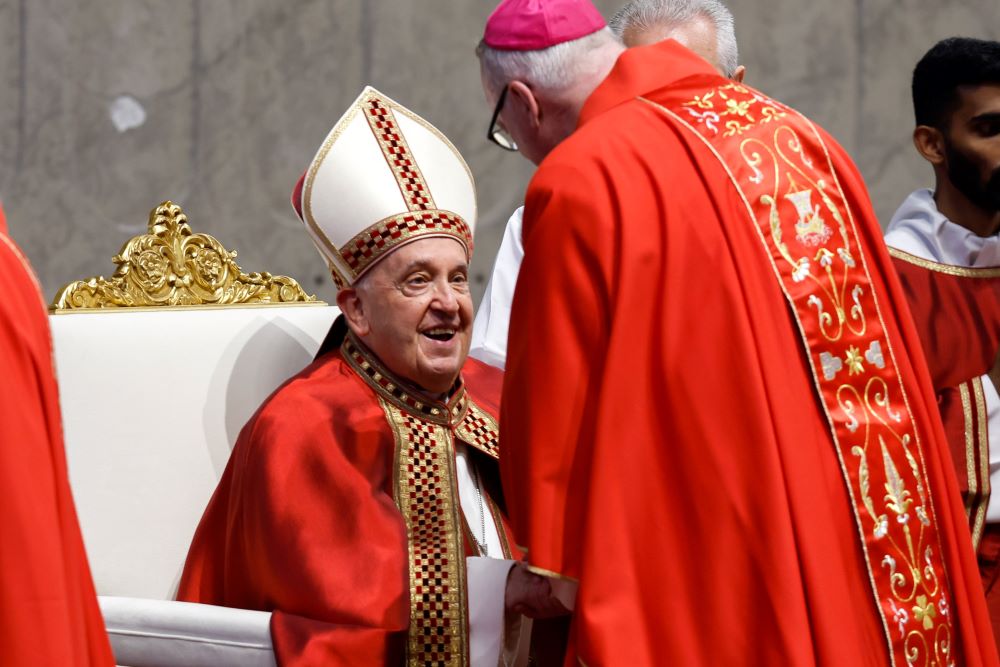
Pope Francis gives the pallium to Archbishop Christopher Coyne of Hartford, Connecticut, during Mass for the feast of Sts. Peter and Paul in St. Peter's Basilica at the Vatican June 29, 2024. (CNS/Lola Gomez)
The decision by the U.S. bishops conference to dramatically slash its staff for the department responsible for implementing some of Pope Francis' top priorities has been called "very disappointing" and "somewhat duplicitous" by one of the pontiff's newest archbishops in America.
"I am very disappointed," said Archbishop Christopher Coyne of Hartford, Connecticut. He said he was surprised that less than two weeks after the U.S. bishops' met for their annual spring assembly that the conference's leadership decided to move forward with major layoffs in its social justice department.
"We were led to believe that it would continue to be a vibrant part of the conference," Coyne told the National Catholic Reporter on June 29. "At no point was any discussion made or talked about in terms of significant employee cuts. … It comes across as being somewhat duplicitous in terms of what was actually discussed with us as bishops and what actually happened."
'The new voices in the room are much more open to more of the flavor or the agenda that Francis is painting for us.'
—Archbishop Christopher Coyne
Coyne recently traveled to Rome to take part in the annual Mass for the blessing of the pallium for new archbishops on the feast of St. Peter and Paul. During the liturgy, each new metropolitan archbishop named in the past year receives the archbishop's pallium, a liturgical vestment signifying their participation with the pope in the pastoral governance of the universal church.
While Coyne may be new to Hartford — he was named coadjutor of the archdiocese in June 2023 and officially took over on May 1 — the archbishop has been well known on the American scene for a quarter century predating his time as bishop.
In 2002, the native Boston priest was appointed spokesperson for the Boston Archdiocese at the height of the clergy abuse scandal there. It was a bruising period for the church and the city, but in a sharp reversal from past church leaders, Coyne quickly developed a reputation as a straight shooter who refused to defame victims or cover up for the church's misdeeds.
From 2011 to 2015, he served as auxiliary bishop in Indianapolis, Indiana, until his appointment as bishop of Burlington, Vermont, 2015-2023.
"I have always tried to serve the chair of St. Peter regardless of who is in the chair," Coyne told NCR. "Each of the three popes that I've served as a priest, now as a bishop, each brought different ways of understanding the church, governing the church, and each had their own gifts. For me, it's not a matter of choosing one over the other. It's about seeing the greatness that was there."
But, he acknowledged that for some of his brother bishops in the United States, the Francis pontificate has been a difficult adjustment.
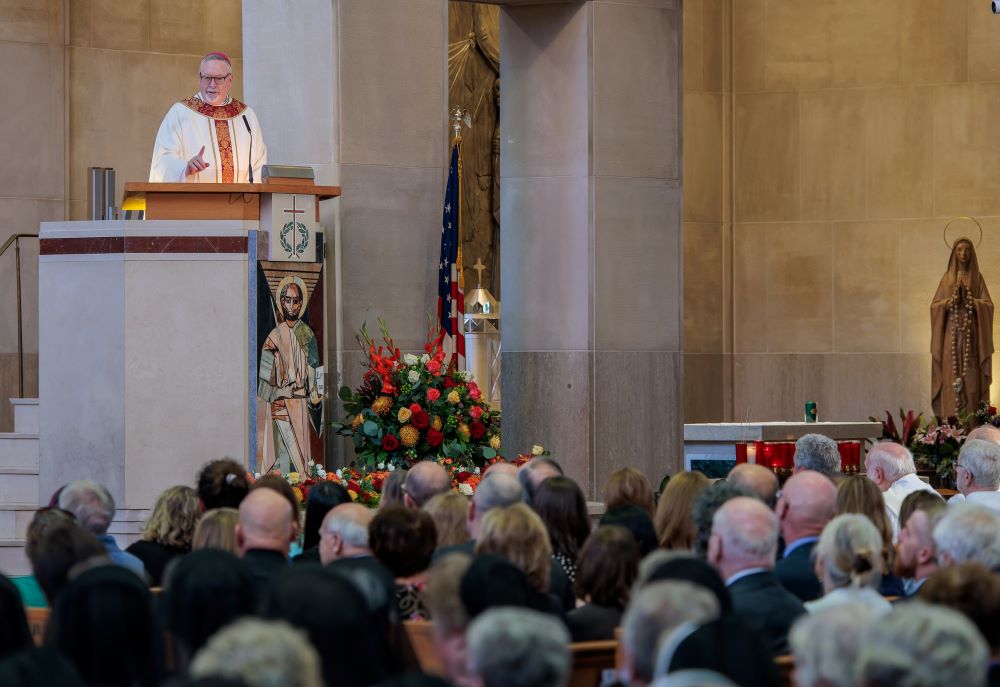
Coadjutor Archbishop Christopher Coyne delivers the homily during a Mass of welcome at the Cathedral of St. Joseph in Hartford, Connecticut, Oct. 9, 2023. (OSV News/Courtesy of Archdiocese of Hartford/Aaron Joseph)
"Francis is someone who I think is a prophet," he said. "He plays the role of a prophet in the sense that he loves to push the envelope and challenge us. He loves to move us out of our comfortable medium.
"He's not changing doctrine," said Coyne. "He's been pushing us to say 'how do we handle situations and cultures and peoples that feel unwelcome or don't feel much a part of the church?' "
Coyne recalled a 2023 interview in America magazine with Cardinal Christophe Pierre, the pope's ambassador to the United States, where the cardinal said that some American bishops were struggling to understand Francis and lacked an appreciation for the pope's commitment to making the church more participatory and more inclusive through synodality.
Those remarks, said Coyne, caused an "uproar," but, in his estimation, were accurate.
"No one likes to have the mirror held up to his face, but I completely agreed with his reading of the church," said the archbishop.
"Collectively, I believe we tend to be a more conservative, Republican type of community," he continued. The addition of new bishops more closely aligned with Francis' vision is helping things in "the right direction," he added.
In particular, Coyne pointed to the recent discussions at the U.S. bishops' plenary over the future of the Catholic Campaign for Human Development, which works to fight poverty. While that portion of the meeting took place in executive session, Coyne said it was clear that "very few bishops" would be willing to sunset the program.
"That says to me there's a Francis effect going on," he said. "The new voices in the room are much more open to more of the flavor or the agenda that Francis is painting for us."
Advertisement
But for now, Coyne said he is primarily concerned with the new opportunities and challenges in the three counties that make up the Hartford Archdiocese, including going from Vermont — the least diverse state in the country — to an archdiocese with significant minority populations that are thriving.
With a population of some 400,000 Catholics spread out over almost 120 parishes, he pointed to the "vibrant" Latino and Vietnamese Catholics where he said he sees his role as both fostering the individual cultural communities, while supporting and staffing them so they can "be brought into the mainstream."
"They shouldn't be seen as silos," he said. Nor does he want to see them repeat the mistakes of past generations of American migrant communities who, after several generations, begin to disaffiliate from the faith.
In thinking about the challenge of evangelization, Coyne — who is a trained liturgist — said that "good liturgy, good music, good preaching brings people to the table."
"People are looking for places to come to worship, and if they walk through the door, we've got to provide that," he said.



